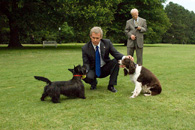

|
| home | movie reviews | features | sov horror | about | forum |
W. B
Year Released: 2008
Oliver Stone always freaks me out a little when he plays it straight. Not that he isn't good at it -- Platoon, for example, is one of his very best films. Then again, so is JFK, and no one ever accused that movie of taking a dry, even-handed approach. It may simply be a matter of hedging one's bets. Restrained Stone may be good or bad, but overheated Stone is good even when it's dreadful. And what better chance to go completely berserk than with the life story of outgoing "decider" George Walker Bush? With Stone's political liberalism, a disastrous approval rating for his subject, and real-life events far stranger than any fiction, why not drop all pretense and turn the film into Alexander Crawford-style? The answer is that, while W. might be oodles more fun if it were a whacked-out hatchet job, it wouldn't have been nearly as interesting as it turns out to be. The movie makes for a surprisingly nuanced exercise, daring to examine the human subtleties of a man who -- for better or worse -- has shaped the world for the last eight years. W. resembles a postmortem rather than an accusation: not an attempt to deride Bush's failures, but instead an examination of what drives his decision-making process. Stone sets his boundaries by toning down the more inflammatory subject matter -- civil rights abuses, Hurricane Katrina, the overall effectiveness of the war on terror -- and instead looks at the centerpiece of the Bush administration: Iraq. We see numerous conversations between Bush (Josh Brolin) and his Cabinet arguing the particulars of taking out Saddam Hussein, which Stone intercuts with episodes from Bush's earlier days: his fraternity initiation at Yale, his boozing with Texas oil buddies, his punishing first Congressional campaign, and the religious conversion which he credits both for helping him overcome his alcoholism and correcting his political ship. The familial relations among the Bush clan become the crucible through which he is forged. As far as events go, W. merely skims the surface: seeking well-documented moments that will reinforce its central conceit. That would be the unspoken conflict between George Jr. and George Sr. (James Cromwell), whose shadow looms large over his firstborn's life and whose Oedipal overtones prove impossible for Stone to resist. 41 is everything 43 isn't: cautious, pragmatic, given to over-analysis, and absolutely impossible to please. W. struggles not just to earn the old man's approval, but to prove he's not the family fuckup that everyone thinks. Younger brother Jeb (Jason Ritter) has been anointed the next generation's golden boy, a position that W. not only endeavors to usurp but use as a weapon against Bush Sr.'s unspoken judgments. Years later, he sits in his war room with a familiar cast of characters planning to "correct" dad's big mistake by picking up where the Gulf War left off. Threads of the narrative hint at larger, more polarizing issues. Karl Rove (Toby Jones) lingers ominously in the frame, and W.'s infamously negative campaign tactics are reflected both in his early political defeats and his crafting of the Willie Horton ad that helped land his father the White House in 1988. Stone covers the dynamics of his Cabinet as well, centering mainly on the power struggle between Secretary of State Colin Powell (Jeffrey Wright) and Vice President Dick Cheney (Richard Dreyfuss). But all of them circle back to their impact on the president himself and his efforts to at once embody and transcend his family's expectations. As wife Laura (Elizabeth Banks) observes, it's a double-edged sword: the boldness that led Bush to seek higher office and create a democratic Iraq goes hand-in-hand with the impulsive decisions and lack of analysis that squandered the aftermath of the war so terribly. It could have been outrageous -- the facts on the ground are worthy of high camp -- and yet it's Stone's sense of balance that ultimately carries the day. He infuses W. with overtones of comic tragedy, depicting a well-meaning man who wants so badly to do right that he can't see where it all went wrong. Some of the performances are a trifle broad (Thandie Newton's Condi Rice comes straight out of sketch comedy), but Brolin himself finds a sympathetic soul beneath the self-absorbed bravado. It helps us to understand not only what drove the president to act as he did, but how his decisions shifted the world we live in so dramatically. The sense of objectivity -- the lack of an overt agenda -- makes W.'s engrossing aspects all the more surprising. It moves along in an engaging and entertaining fashion, without an ax to grind and yet without shrinking from the consequences of the past eight years. In the process, it edges this polarizing figure into the realm of analysis rather than demagoguery. It will be interesting to look back on it in 10 years and see how much of it has been embraced by history. Until then, W. still makes for a fascinating viewing experience, no matter which side of the political aisle you stand on. Review published 10.19.2008.
|

|
| home | movie reviews | features | sov horror | about | forum |
| This site was previously at flipsidemovies.com from 2000 to 2008. |
|
contact | copyright | privacy | links | sitemap
Flipside Movie Emporium (FlipsideArchive.com)
|